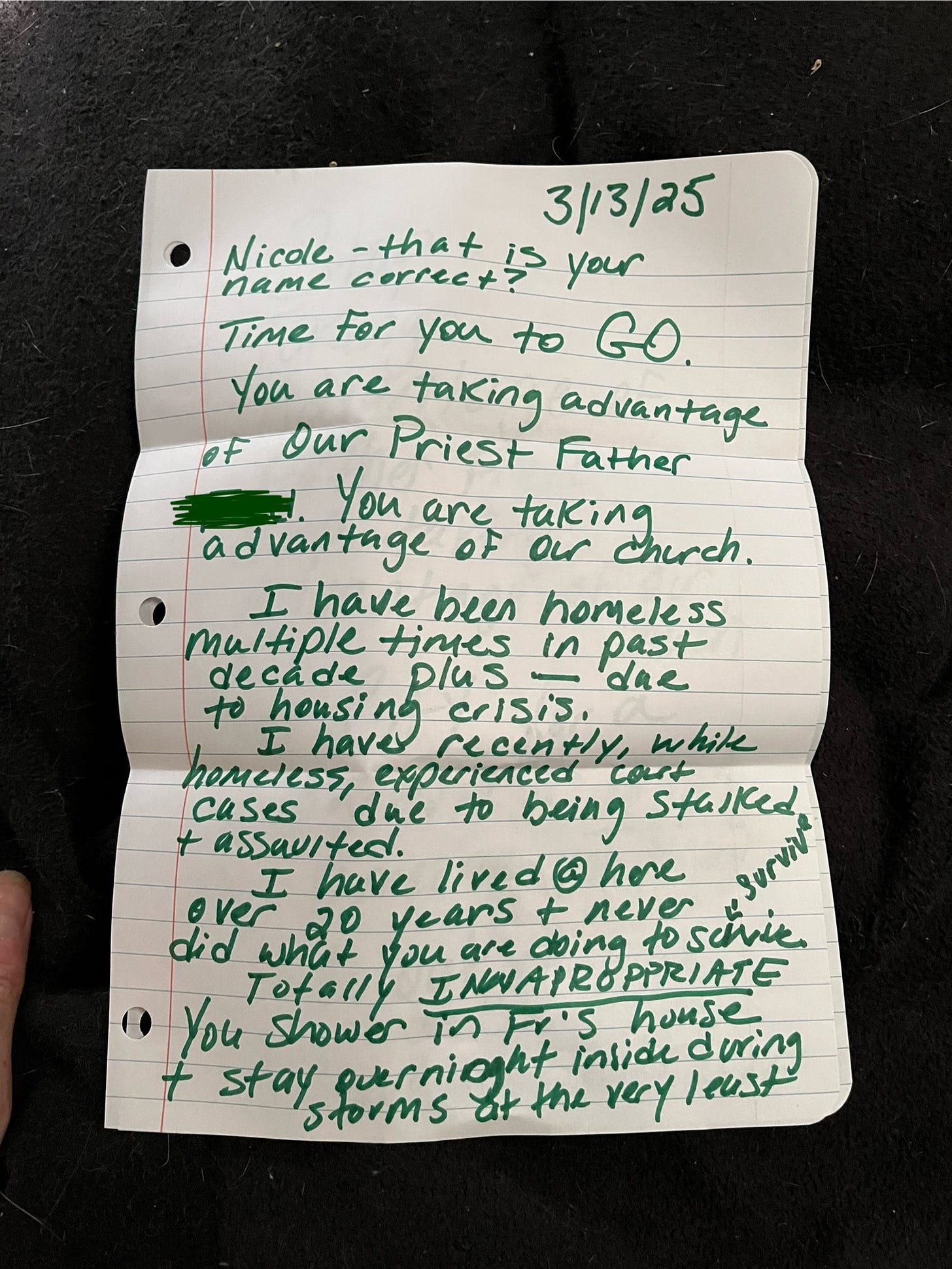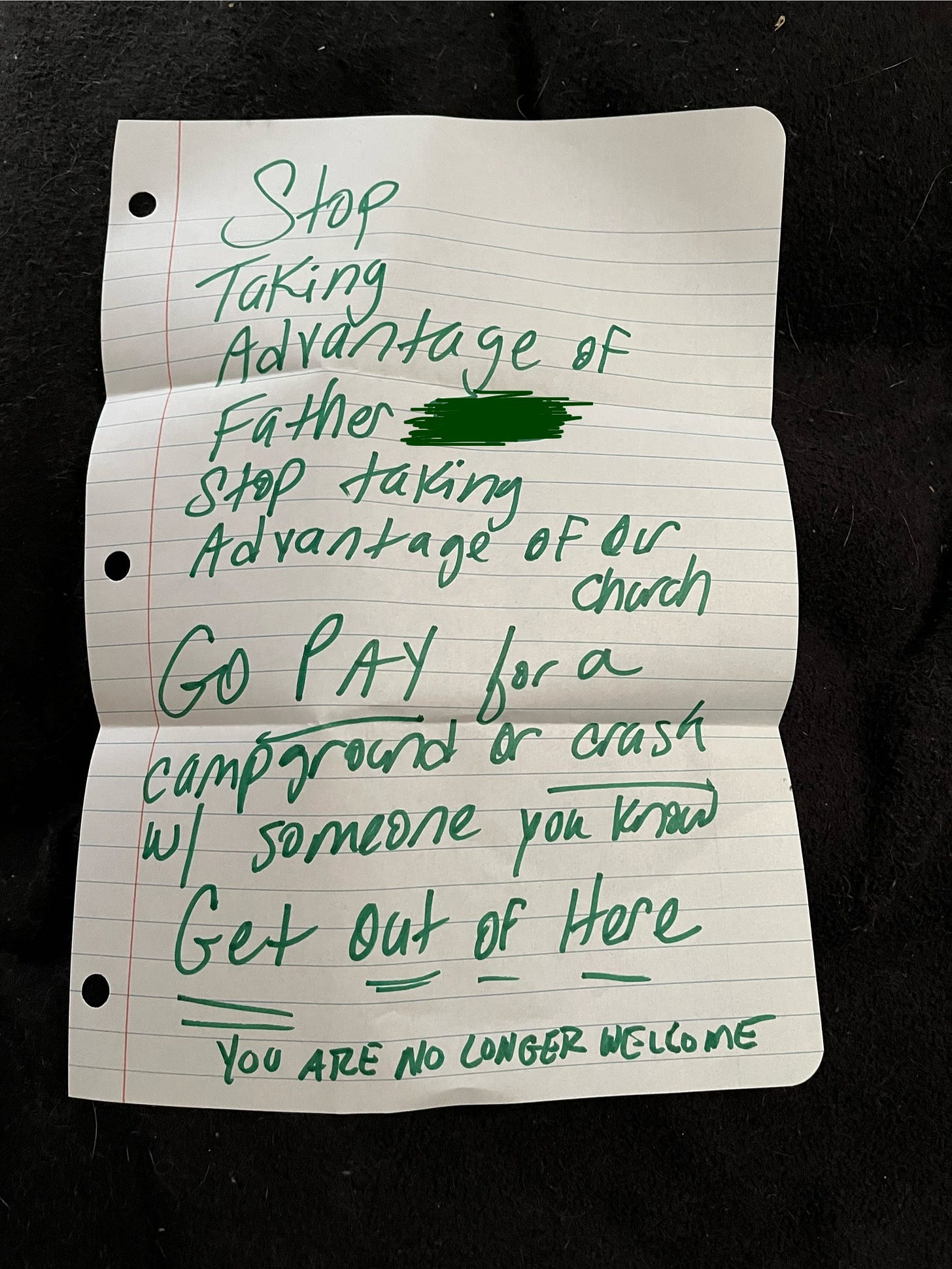The other day after Mass I was inside my vehicle preparing something to eat—parked with permission on the church property.
I was startled by a loud noise on my windshield and went to see what it was, thinking perhaps a wild animal or bird would be neat to see.
It wasn’t either.
Instead, a woman I’d met at a fellowship lunch the day before appeared next to my driver-side window, startling me.
“Hello!” I greeted her with a surprised laugh.
She told me she’d put a note on my windshield and to please read it.
I said okay and told her I was cooking so couldn’t hop out at the moment.
She said she would hand it in to me and passed it in through the crack in my window—urging me a second time to read it.
I thanked her, told her I would do so once done cooking, then wished her a nice day as she walked away.
I finished preparing my food, set it aside, and opened the envelope.
I anticipated kindness. Perhaps a warm gesture, an invitation, a shared scripture?
Instead, what I read made my stomach drop. I lost my appetite.
Threatening. Accusatory. Rude.
A condemnation.
A demand I leave.
Same story. Still shocking.
This woman, whom I had spoken to only once, came out of her way to confront me about her beliefs—not to extend compassion, not to welcome me further into the fold, but to assert control.
To tell me that I was no longer welcome in a place where I had been expressly invited by the priest himself—an agreement she had no business in or knowledge of in the first place.
I’ve been parked outside—healing, reflecting, and exploring my faith here. Hurting no one.
I’ve been attending daily Mass and meeting members of the community, looking for opportunities to work—considering how I might make the area my forever home.
Every day I offer my gifts and graces in gratitude to the priest and parish.
Here I Am.
It’s as though she sees the walls of this church not as sacred space where all are welcome, but as her own private territory—one that she has the right to police and gatekeep, to ensure only the right kind of people get inside.
Clearly, I do not meet her criteria.
And the priest?
Apparently, his discernment is not enough for her.
And churches wonder why they continue shrinking.
The Great American Delusion: When Feelings Outweigh Faith
This is not a Catholic problem.
This is not a religious problem.
This is a cultural disease.
America has bred a particular kind of person—one who conflates ownership with righteousness and membership with entitlement.
They sit in pews, recite prayers, tithe their share, and somewhere along the way, they begin to believe that their participation in a faith community grants them the power to decide who gets to be part of it.
They think:
“This is my church.”
“This is my country.”
“This is my Capitol—I will dictate who belongs here and how it’s run.”
The irony, of course, is that these same people love to invoke the name of Jesus as they do it.
They love to claim Him—but do they even know Him?
Absolutely not.
Because if they did, they would recognize how little they actually resemble Him.
They’re hypocrites and Nasty Nellies.
Jesus was homeless.
Jesus was unwanted.
Jesus was treated like an outsider by locals.
Just like me.
When I stepped onto this church property to ask for sanctuary, I did not expect privilege.
I did not expect comfort.
I did not expect special treatment.
I hoped for safety and solitude to grieve and regroup, as that is what the Church was designed to be.
That is what Jesus Himself required.
Because let’s be clear about something:
Jesus did not have a home.
“Foxes have dens and birds have nests, but the Son of Man has no place to lay his head.” (Matthew 8:20)
Jesus relied on the hospitality of strangers.
“Jesus traveled from one town and village to another, proclaiming the good news… The Twelve were with him, and also some women who were supporting them out of their own means.” (Luke 8:1-3)
Jesus was rejected, harassed, and cast out.
“He came to his own, and his own did not receive him.” (John 1:11)
And yet, these are the very people who now claim to speak for Him.
The woman who wrote that letter fancies herself a disciple.
But would she have welcomed Christ?
Would she have fed Him, housed Him, or made space for Him?
Or would she have done what she did to me—walked up to Him with a note that said, “You don’t belong here. Get out!”?
Because make no mistake—Jesus did not belong in the eyes of people like her.
Jesus Was Gentle—Until He Wasn’t
At the start of His ministry, Jesus gave without judgment.
He healed, He forgave, He welcomed.
But what did He do when He saw hypocrisy?
When He saw corruption?
When He saw so-called religious people using faith to wield power over others?
He called them out.
He condemned their actions.
He flipped tables.
“My house shall be called a house of prayer, but you are making it a den of robbers!” (Matthew 21:13)
This is what the modern American Christian does not understand.
Jesus was kind, but He was never weak.
Jesus was merciful, but He was never passive.
Jesus was a healer, but He was also a warrior for truth.
Just like Me.
So if they think I will bow my head and slink away, they do not understand faith at all.
I Do Not Answer to You. I Answer to My Father.
This woman does not dictate my faith.
This church does not define my calling.
This town does not determine my worth.
I have one authority, and it is God.
He gave Me life.
He gave Me mission.
He directed Me to this space.
Not to be comfortable.
Not to be liked.
Not to make small people feel bigger by begging for their approval.
I was sent here because the mission of God is beyond mere mortals.
If this place proves unworthy of that mission, I will take it elsewhere.
If I do not see a radical shift in the way people treat each other, I will go where the work can be done.
Because My mission continues—with or without them.
And I refuse to waste My God-given breath on those who already rejected the Christ they claim to serve.





